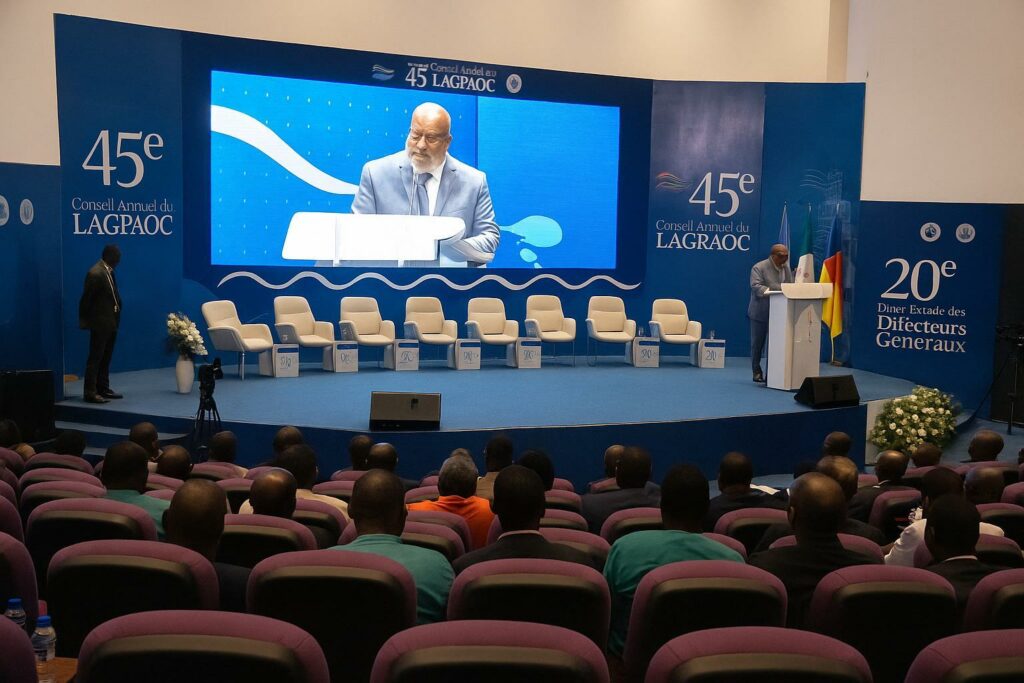Port leaders convene in Pointe-Noire
The Atlantique haze hanging over Pointe-Noire could not blur the sense of urgency expressed inside the conference room where the 20th round-table of directors-general of the Association of Port Management of West and Central Africa (Agpaoc) opened on 4 November. Presiding over the meeting, Arthur Borogui-Kuma, head of Ontario-Gabon and freshly elected chair of the session, warned that African port platforms are standing “at a decisive crossroads where governance must evolve as rapidly as trade flows”. His assertion set the tone for three days of closed-door discussions designed to chart an operational course for the region’s gateways.
Demography and logistics demands reshape priorities
Participants immediately pointed to the demographic boom criss-crossing the Gulf of Guinea littoral. More inhabitants translate into greater consumption, accelerating a massification of maritime cargo that older terminals struggle to absorb. Borogui-Kuma argued that, unless management structures become more agile, ships will simply reroute to hubs perceived as more reliable. Behind the diplomatic phrasing lies a clear acknowledgement: handling capacity and service continuity are now decisive criteria in global shipping alliances.
Equipment renewal and environmental imperative
A second layer of pressure stems from the modernisation cycle imposed by technological change and decarbonisation agendas. Cranes, yard equipment and information systems require hefty investment just to remain compliant with international standards. Yet, as several directors conceded during an informal exchange, financing remains volatile. Environmental regulation adds further complexity; ports are expected to curb emissions while preventing coastal pollution, objectives that demand both capital and managerial coherence across agencies.
Legal and fiscal alignment on the negotiation table
À retenir : the round-table dedicates an entire stream to the harmonisation of legal and fiscal frameworks, viewed by delegates as a prerequisite for credible partnerships with shipowners and banks. Lawyers advising Agpaoc reminded the audience that contradictory concession regimes inside the same maritime corridor can chill investor appetite. Discussions therefore revolve around crafting templates capable of guaranteeing legal certainty without undermining the sovereignty of each member state.
Unlocking land value for sustainable growth
Beyond quays and breakwaters, port authorities control vast land reserves whose economic potential often remains dormant. One session focuses on transforming this foncier into revenue-generating logistics parks or industrial clusters. Several private operators, invited to share case studies, underlined that transparent allocation rules and predictable ground rents are indispensable to crowding in long-term capital. For Borogui-Kuma, valorising land assets is not merely a financial lever; it is a way to embed ports deeper into national development strategies while easing budgetary constraints on infrastructure renewal.
Private sector experience and regional integration
Le point juridique/éco : concessionaires attending the meeting insist that clear dispute-resolution mechanisms must accompany any shift in governance. They argue that an independent arbitration clause, backed by regional institutions, would mitigate conflict risk and fast-track integration into international logistics chains. Such mechanisms would also support the African Continental Free Trade Area’s objective of frictionless trade, a goal Agpaoc members reiterate without detracting from each state’s regulatory prerogatives.
Charting a collective roadmap for resilience
Organisers expect the sessions, scheduled to run until 6 November, to produce a concise matrix of actionable measures. Draft recommendations include a shared digital dashboard to monitor vessel movements, joint training programmes aimed at middle management, and the establishment of an environmental observatory pooling scientific data across the coastline. While the wording of the final communiqué remains under negotiation, early drafts reveal a determination to balance competitiveness with sustainability.
A tempered optimism
Speakers mingling in the sidelines acknowledged that re-engineering governance structures, however vital, will demand political endorsement at both national and regional levels. Yet the presence of technical and financial partners in Pointe-Noire lends weight to Borogui-Kuma’s closing thought of the opening day: “We cannot postpone adaptation; the tide of commerce will not wait for us.” For now, the conference hall buzzes with cautious optimism that a coordinated strategy can keep African ports firmly on the map of global maritime trade.

